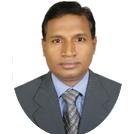Invited Speaker-----Dr. Md. Abdul Karim

Professor, Laboratory of Microbiology, Department of Botany, University of Dhaka, Bangladesh
Biograph
Dr. Md. Abdul Karim is a Professor and Principal Investigator of bioremediation of waste water in the Laboratory of Microbiology, Department of Botany, University of Dhaka, Dhaka. He earned his PhD at Ehime University, Japan. Research in his lab focuses on understanding of how to evaluate and control microbial activities in eutrophic environments. His current project includes 1) Bioremediation of eutrophic environments, 2) Characterization of hydrocarbon and textile dye degrading bacteria, 3) Isolation and characterization of multidrug resistant bacteria from environmental samples and hospital wastes; and 4) Understanding of how pathogenic bacteria can survive longer period in adverse condition in association with other microorganisms and their interrelationship. He has supervised over 27 postgraduates and PhD. He has published 62 peer-reviewed papers in microbiology, author of 12 book chapters and 3 research books.
Prof. Karim is an executive editor of Bangladesh Journal of Botany (BJB) and member of editorial board of Journal of Asiatic Society of Bangladesh, Science; Science International; World Journal of Applied Sciences; International Journal of Biosciences; Journal of Biodiversity and Environmental Sciences; Microbiology Research International, Journal of Biological Sciences. He was awarded by University Grants Commission in the recognition of his outstanding performance in his field.
Speech Title: BIOREMEDIATION OF POLLUTED RIVER WATER USED FOR IRRIGATION BY BACTERIA
Abstract: Different organic or inorganic compounds can cause the pollution of aquatic bodies and microorganisms often play a major role in determining the extent of this pollution. The river Buriganga, Turag, Dholessori are found to be Dhaka’s main outlet of sewage waste. The residential and commercial establishments along the river cause discharge of wastewater either directly into the river or into drains and canals which subsequently find their way into the river. So, investigation of water quality of river to mitigate the problems is an utmost need. The present project has been undertaken for determination of the quality of water and application of bioremediation for improvement the quality of water through enhancing the decomposition of pollutants using indigenous bacteria.
To get a fair idea about the microbial abundance as well as physicochemical parameters of the river water samples were collected from selected sites at 5 different seasons (summer, rainy, autumn, late autumn and winter). Temperature and pH of water varied 22 to 32ºC and 6.61 to 7.14, respectively, while air temperature varied between 16 and 33.5ºC. Aerobic heterotrophic plate count (HPC) showed a range of 1.0 × 105 to 20 × 105 cfu/ml in water, while, enteric and related bacterial count in 3 different media (SS agar, MacConkey agar and Cetrimide agar) showed 12 × 102 cfu/ml to uncountable, 3 × 102 to 19 × 102 cfu/ml, and 0-14 cfu/ml in water, respectively. Chemical content like NH4+-N, NO3--N, NO2--N, and PO4- values were showed the water is polluted. Furthermore, the abundance of aerobic HPC and the presence and abundance of Escherichia, Proteus morganii, Plesiomonas sp., Hafnia sp. and Alcaligenes sp. indicate the microbial pollution.
To enhance heterotrophic activities after decomposing organic matter in the polluted river water, three promising indigenous bacterial isolates were introduced into the experimental system. Addition of Bacillus subtilis strain: E20, Chryseobacterium indologenes strain: NBRC 14944 and Bacillus subtilis subsp. subtilis strain: A17 showed increasing net regeneration of dissolved inorganic nitrogen (DIN) and dissolved inorganic phosphorus (DIP) in the sample water collected in June 2018 by approximately 50%. Same exponential trends were also seen with the samples collected in October 2018. These results suggest that the application of such effective bacteria as described here would be promising for the improvement of polluted aquatic environments.
Key words: Bioremediation, polluted environment, Bacteria

